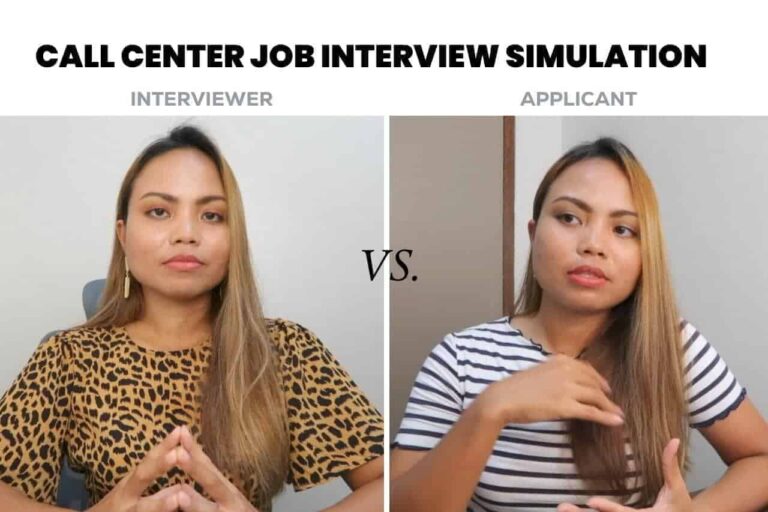Behavioral call center interview questions ask you to recall an past experiences at work and how you handled them. They usually start with, “Tell me about a time in your past job when…” but not all the time. When interviewers ask this, they want to get a glimpse of how you work in the past as it signifies how you would work in the future.
In your case as a call center applicant, the questions’ focus will lie on your ability to:
- handle stress
- problem-solve
- work with a team
- negotiate and communicate
- sell
In this article, you’ll learn how to answer behavioral call center interview questions as well as their slight difference from situational interview questions.
Table of Contents
How to Answer Behavioral Call Center Interview Questions
There are two ways to answer behavioral call center interview questions:
- STAR stands for Situation, Task, Action, and Result. This framework applies when your interviewer asks you to recall a very specific event in your past. The questions usually start with, “Tell me about a time when…”
- Tell me about a time when you had to go above and beyond for a customer.
- Tell me about a time you were in a high-stress situation. How did you deal with it?
- Tell me about a mistake you made in your past job and what you learned from the experience.
- Tell me about a time when your integrity was put to the test.
- Describe a time you weren’t happy at work and why.
- Give me an example of when you worked well with a team.
- Describe the most difficult customer interaction you’ve had. What did you do?
- Can you tell me about your most impressive customer service moment?
- Answer + Explanation. This applies if you’re only talking about things in general and not recalling a specific event. For example:
- How do you balance high-quality customer service with speed?
- When are you usually most satisfied with your job?
- What is your typical way of dealing with an irate customer? Give me an example.
- Do you prefer to work as part of a team or independently?
- How do you handle stress?
Tell me about a time when you had to go above and beyond for a customer.
Step 1: Situation
As much as you can, paint a clear picture of the situation. Provide enough details so your interviewer can clearly picture the scenario you were in. Whatever you do, don’t be vague.
“I had this conversation with a customer named Tatiana whose refund was refused because she returned a non-returnable Chanel handbag. I’ve seen enough similar cases to hers to know that it was a hopeless case, that there was no way that the company would give her the refund.
“At first, she was very combative, she was demanding a supervisor, but the supervisor was engaged in another call.
Step 2: Task (problem or challenge)
Tell the interviewer the goal or task you were working towards. This could be the point in your story where you faced a problem or a challenge.
“My task, therefore, was to get Tatiana to accept the news without having to escalate her to my supervisor.”
Step 3: Action
Next, detail how exactly you carried out the task. Be very specific. List the steps you took to solve the problem.
“So I stood my ground, told her firmly that we couldn’t refund her because it’s company policy but I also acknowledged her emotions. After that, she eventually calmed down and she was no longer combative.
“I’ve handled calls like this many times before but I think what made this one so hard was when she revealed that she had lost her job due to the pandemic.
“She also admitted that she knew the handbag was non-returnable but she returned it anyway hoping against hope that the company would refund her.
“I know I should have just told her again that it wasn’t possible but I put her on hold anyway and waited for my supervisor to be available to ask if an exception was possible. My supervisor, of course, said no. I then relayed the answer to Tatiana. She thanked me, she said it was okay and that she’ll figure it out.
Step 4: Result
What happened after you went above and beyond for the customer? What was the outcome? Try to use examples with very specific outcomes; use numbers if you can. The result should clearly show the benefits of going above and beyond for the customer.
“To my surprise the next day, she gave me a perfect 10 CSAT score. I think what made her do that even if she didn’t get the refund was because I made her feel that she mattered and that she was being listened to, even if we both knew it was a hopeless case.”
Tell me about a time you were in a high-stress situation. How did you deal with it?
Situation: I usually have a high tolerance for stress but there was a period of my employment when I was struggling with stress. It was the time when the account I worked for filed for bankruptcy.
Task (or problem): This meant telling every customer who asked for a refund that they could no longer get their hard-earned money. In a span of 4 months, that made up 90% of the call we get every day. It was quickly draining my energy and motivation.
Action: I was on the verge of quitting until an idea came to me: Instead of seeing the situation as hopeless and unsolvable, I decided to see it as a challenge, where, in the end, there’d be a reward. When our Team Lead promised us that it would all go back to normal once the account transitions to the new ownership, I saw that as the reward.
So I optimized my habits. I slept early, deactivated my social media accounts, and began working out. It was also the time when I discovered self-help books about productivity.
Result: After 2 weeks, it improved my resilience to stress dramatically. While the customers remained as irate as ever, my job became easier just by optimizing my routine. After 4 months of irate calls, the company finally transitioned to new ownership and everything came back to normal. I was also offered the position of Team Lead.
Tell me about a mistake you made in your past job and what you learned from the experience.
Situation: When I was still a call center trainee, I was afraid to ask questions for the fear that my trainer and co-trainees would see me as clueless. So huge was my fear of looking clueless that from the start to the last day of training, I never did ask a single question even if I was confused the whole time. When the day to take calls came, I highly regretted it.
Task (or problem): On our first day, we were expected to assist the customers like experienced agents. It was quite a shock to me. I could barely answer my customers’ questions without asking for help from the tenured rep beside me. She even asked me what exactly I learned from training. It was humiliating but it was also a wake-up call.
Action: To survive the next days, I listed down all my questions and confusions and sat down with my trainer. I was so desperate that I practically begged her to help me. Luckily she was so open and helpful to me. And we talked for more than an hour.
Result: At that moment, I realize that in order to learn something, you need to be willing to look clueless first, that’s there’s actually nothing wrong with looking clueless. All experts used to be clueless the first time.
Tell me about a time when your integrity as a QA was put to the test.
Situation: Since I was the only QA in our account, my friends in the office knew that I was definitely the one rating their calls.
One day, one of them indirectly told me that it would be nice if I could pick the calls where they highly scored, not the ones where they failed so they would get their performance bonus. The suggestion was very subtle but it was definitely there.
Task (or problem): For me, it was just out of the question. I’ve always been operating on the principle that, instead of giving someone a fish, you should teach him how to fish.
Action: It was a tough and awkward situation to be in but I did tell them firmly that it would be unfair for everyone else. I also added that if they need help, they could ask me anything. Eventually, I ended up discussing the mistakes they made during their calls and what they could do to score higher next time.
Result: Since then, they never again broached the subject of manipulating their scores. If they did, then I don’t think I’d be able to keep them as friends anyway.
Describe a time you weren’t happy at work and why.
Situation & Task: I’m not happy at work every time I encounter a customer whose problem could have been solved if the previous agent only followed the First Contact Resolution. It’s honestly one of my pet peeves because first, it wastes time; and second, it leaves a bad taste in the customer’s mouth.
Action: What I usually do when I encounter something like this is to assist the customer as best as I can so she won’t call again for the same issue. And if I notice the same issue happening again, I would take note of it and bring it to the attention of my Team Lead so she can remind everyone.
Result: This always solves the problem. If there’s one person who can keep issues from happening again, it’s the Team Lead because he does a weekly one-on-one meeting not only with her team but also with other Team Leads.
Give me an example of when you worked well with a team.
Situation: In my previous position as an agent, I had a colleague who was not only a newbie to our account but also to the call center industry. She passed the training but she was clearly having a hard time adjusting to customers, not to mention information overload. There were times when she would escalate a call even if it was a simple issue.
Task (or problem): It was affecting our overall stat as a team. Our team’s goal at that time was to reach at least a 90% QA score every month so we would get our team performance bonus.
Action: So I decided to volunteer to sit next to Ella (the newbie). Our Team Lead and I would take turns assisting her. When he’s out in a meeting or taking sup calls, I’d be the one beside Ella helping her with her questions especially about call de-escalation.
Result: I did that for 2 months until she finally became better at everything and I didn’t have to coach her. But within those 2 months of Ella being a newbie, our team managed to score an average of 93% each month. This meant getting our team’s bonus on top of our individual bonuses. A challenging task but very fulfilling.
Note, however, that STAR only applies if you’re talking about a very specific, actual scenario in the past.
If the question isn’t necessarily asking you to recall a specific event in your past, or if the question is only asking about your performance in general, just state your Answer along with the supporting Explanation.
Just make sure that your answer is going to paint you in a good light as a potential employee.
Here are some examples:
How are you able to balance high-quality customer service with speed?
Answer: I’m able to balance high-quality customer service with speed by knowing exactly when to optimize for quality and when to optimize for speed.
Explanation: For example, an irate customer’s end goal is not only to solve her problem but also for her frustrations to be heard. You cannot rush this type of customer; she will always want to be heard one way or another. In this case, you have to optimize for quality more than speed.
On the other hand, there are customers who are in a hurry or are already tech-savvy and don’t need much explanation. In which case, you have to optimize for speed. They’ll only be irritated if you don’t speed up so you should never slow these customers down. You need to keep it brief and simple.
So by knowing when to speed up and when to optimize for quality, I can easily meet my stats and adjust when I’m lagging behind.
Also, irate customers are usually few and far between so even if I spend more time with them, I can easily compensate as soon as I start assisting fast customers with uncomplicated issues.
What’s good: This answer is so detailed and specific. It shows the interviewer two things: that you work methodically and that you have great expertise in customer service.
When are you usually most satisfied with your job?
I feel most satisfied when I’m able to help a customer with a particularly difficult issue. It just makes me feel useful. When I feel useful, I feel happy and motivated. Oh, and the performance bonus also doesn’t hurt.
There are, of course, times when the company policy limits what I can do for the customer. In cases like this, I just satisfy myself with the mantra that as long as I’m doing everything I can for the customer, I’m useful and I’m happy..
What’s good? This answer demonstrates that you’re someone who is motivated by tasks that highlight your expertise.
When you’re able to demonstrate your expertise to your customer, you feel accomplished. For a customer service representative, this is a particularly important feeling to have.
Do you prefer to work as part of a team or independently?
Answer: I’m an introvert so I naturally prefer working independently. But if there’s something I learned from my 4 years of working in customer service, it is that I cannot do everything without working with a team. So it has taught me how to work well with a team.
Explanation: In my previous account, we were serving high-profile clients so there simply wasn’t much room for mistakes. There were also constant changes and updates so everyone in the office had to interact with one another to make sure that we’re all on the same page. I couldn’t have possibly done that job without the help of my Team Lead and colleagues.
What’s good: This answer shows that even if you are an introvert, you can work for a job that requires you to work with a team.
What is your typical way of dealing with an irate customer?
Answer: For me, there are different types of irate customers but they all have one thing in common: They want their emotions to be heard. So I make sure that whatever upsets a customer, I always give him the floor to vent. Once he’s gotten over that initial surge of emotion, then I immediately ask for facts then present the resolution.
Explanation: Time and time again, I notice that when you do listen and acknowledge a customer’s emotion, he’ll also give you the floor for a rational discussion.
What’s good: This answer shows the benefit of the answer. This was also drawn from past experience which makes this sounds even more credible.
Difference between behavioral and situational interview questions
Behavioral and situational questions both evaluate your working style and behavior. The difference is while behavioral questions ask you to recall your actual past experiences, situational interview questions ask about hypothetical scenarios and what you would do in them. In the next article, I’ll talk about situational interview questions with sample answers.
You Might Also Like:






